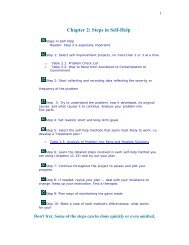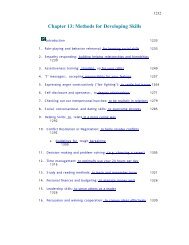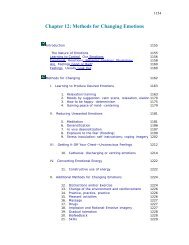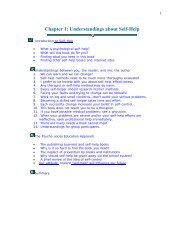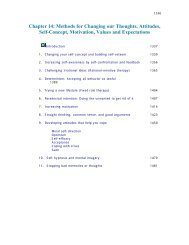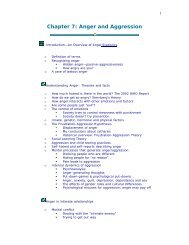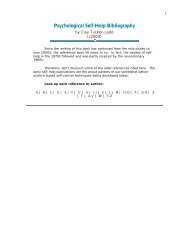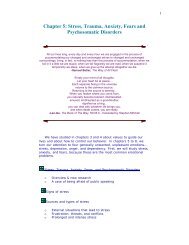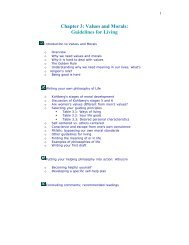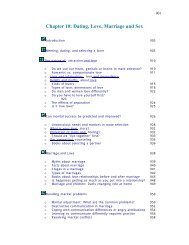Methods for Changing Behaviors - Psychological Self-Help
Methods for Changing Behaviors - Psychological Self-Help
Methods for Changing Behaviors - Psychological Self-Help
You also want an ePaper? Increase the reach of your titles
YUMPU automatically turns print PDFs into web optimized ePapers that Google loves.
improving your social interaction, recognize the new and/or deeper<br />
friendships as being your rewards.<br />
STEP SIX: Make plans to maintain the gains you have achieved.<br />
As noted in chapter 2, most bad habits have a way of gradually<br />
growing back. So, once you have achieved an acceptable weight, it<br />
pays to monitor your weight closely, at least every week <strong>for</strong> 3 or 4<br />
months (probably <strong>for</strong>ever). As soon as you gain two pounds,<br />
immediately start watching your diet and exercise <strong>for</strong> the next few<br />
days until you lose the two pounds. After several months the desired<br />
behavior will become so routine that it will require little attention,<br />
except <strong>for</strong> a moment of attention occasionally to be sure you are still<br />
on target.<br />
Time involved<br />
The simple "behavior-reward" agreements take almost no time at<br />
all, just rearranging the order of things in our lives to serve our<br />
purposes. More complicated contracts take more time. The first three<br />
steps may take 1/2 to 2 hours. The actual rein<strong>for</strong>cement of every<br />
response (or after a few responses) will take detailed scheduling and<br />
arrangement of rewards--perhaps 30 minutes every day but more<br />
likely five minutes. Later, it takes less time. It will probably be several<br />
weeks be<strong>for</strong>e the new response is automatic (see "positive addictions"<br />
in chapter 4). Habits are hard to predict, some changes are easy,<br />
some are unbelievably hard.<br />
Common problems with the method<br />
Many people resist the idea of having their lives mechanically<br />
determined by rewards and punishment, even if they are entirely in<br />
control of rewarding the desired behavior. Some people just aren't<br />
organized enough to count and frequently reward a specific behavior.<br />
Nevertheless, the method works well, so if possible, give it a try.<br />
When required to make a self-improvement, rein<strong>for</strong>cement is the<br />
most common method used. I've seen thousands of such projects.<br />
There are two really common problems: (1) the self-helper wants to<br />
depend on the naturally occurring consequences. Examples: "Better<br />
grades will be my rein<strong>for</strong>cement <strong>for</strong> studying more" or "Good<br />
friendships will be my reward <strong>for</strong> being more outgoing and social." My<br />
response to those proposals is "those rewards have always been<br />
available to you <strong>for</strong> studying or socializing, and they haven't worked<br />
yet! More rein<strong>for</strong>cement is probably needed to get you to change." (2)<br />
The rein<strong>for</strong>cement is not closely associated with the necessary daily<br />
behavior. Often the payoff is months later. Examples: "I'll get lots of<br />
new clothes when I'm down to a size 8" or "My health will be so much<br />
better after I have been on an exercise program." My response is "you<br />
need to rein<strong>for</strong>ce every little behavior along the way--every refusal of<br />
fatty meat, dessert, a beer, etc. and every 10-minute walk, aerobics<br />
1133



